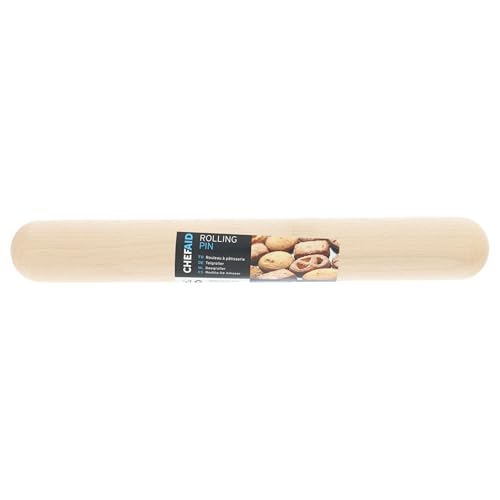Introduction
The size of a rolling pin can vary depending on its purpose and the preferences of the user. Rolling pins are commonly used in baking and cooking to roll out dough or flatten ingredients. They come in different shapes, lengths, and diameters, which can affect their overall size and functionality.
Traditional Rolling Pin Sizes
Traditional rolling pins are typically made of wood and have a cylindrical shape. These rolling pins come in various sizes, ranging from about 7 inches to 20 inches in length. The diameter of a traditional rolling pin can range from around 1.5 inches to 3 inches. These sizes are commonly found in households and commercial kitchens.
Smaller rolling pins, such as those around 7-10 inches in length, are often used for rolling out small batches of dough or for more delicate tasks like rolling out pie crusts. These sizes are convenient for tasks that require finesse and precision.
Medium-sized rolling pins, typically around 12-16 inches long, are suitable for a variety of tasks, including rolling out larger batches of dough or flattening thicker ingredients. They offer a good balance between maneuverability and efficiency.
Larger rolling pins, such as those over 16 inches in length, can be useful for rolling out larger quantities of dough or for working with particularly thick or firm dough. These rolling pins provide more surface area and leverage, which can make it easier to roll out dough evenly.
French Rolling Pin Sizes
The French rolling pin, also known as a “pastry roller” or “rod-style rolling pin,” has a tapered shape and does not have handles. The length of a French rolling pin can range from around 14 inches to 20 inches, with a diameter typically between 1.5 to 2 inches at the center tapering towards the ends.
The tapered design of a French rolling pin allows for more control and precision when rolling out dough. It is commonly used in pastry making and can help achieve a more even thickness when rolling out delicate dough, such as puff pastry or croissant dough.
Specialty Rolling Pin Sizes
There are also specialty rolling pins available that serve specific purposes and come in different sizes. These include:
- Silicone rolling pins: These rolling pins are typically made from non-stick silicone and come in various lengths and diameters. They are often used for rolling out sticky dough or for working with fondant and other decorating materials.
- Marble rolling pins: Marble rolling pins are known for their cooling properties, which can help keep the dough from sticking. They come in different lengths and diameters and are often heavier than wooden or silicone rolling pins.
- Adjustable rolling pins: These rolling pins have removable rings or discs that can be added to the ends to adjust the thickness of the dough. They come in various sizes and are useful for achieving consistent thickness when rolling out dough for pastries or cookies.
Factors to Consider When Choosing a Rolling Pin
When selecting a rolling pin, it is important to consider factors such as the type of baking or cooking you will be doing, the size of the dough or ingredients you will be working with, and your personal preferences.
The average size of a rolling pin tends to fall within the traditional range of 12-16 inches long with a diameter of around 2 inches. However, this can vary depending on the individual’s needs and the specific task at hand.
It is also worth noting that some rolling pins come with handles, while others do not. Handles can provide additional grip and control, especially when working with larger or heavier pieces of dough. Some bakers may prefer the feel and maneuverability of a handle-less rolling pin, such as the French rolling pin.
Ultimately, the average size of a rolling pin comes down to personal preference and the specific requirements of the task at hand. Whether you choose a traditional wooden rolling pin, a French rolling pin, or a specialty rolling pin, selecting the right size will depend on your needs and preferences in the kitchen.






